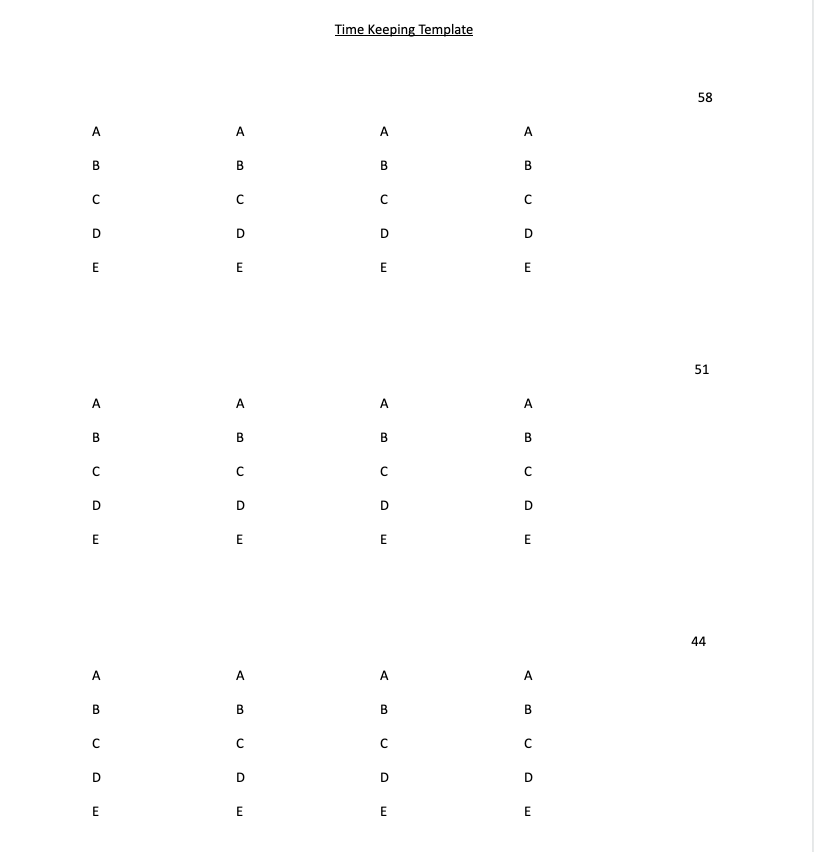There are two fundamental rules if you want to do well on the GMAT:
- Rule 1: Do not leave any questions unanswered
- Rule 2: Do not resort to guessing for the slew of questions at the end
Here are some tips to navigating the GMAT Verbal:
Use the time keeping template below
Write out four rows of A-E, and subtract 7 minutes from the previous time. This budgets 7 minutes for every 4 questions. This will help you understand your pace and try to stay on pace. Having the answer choices written out will also make it easy to cross off incorrect answers and more quickly wrap your head around what is left. It will also be obvious when you have eliminated everything and left only one answer choice. See a sample template at the bottom of this blog post!
Do not guess on the first five
Try to work efficiently, but take extra care here to make sure you do your best to answer the first five correctly. This will set the algorithm at a higher testing level from the beginning and make it that much harder to fall into the “easy zone” where points can be lost.
Remember, other than unanswered questions, the thing that hurts your score the most is wrong answers on easy questions. This is what this entire strategy is designed to avoid. If you notice from experience that you are looking at an easy question, take extra care to make sure you answer it correctly. Conversely, if you notice this is a particularly hard question, do not be afraid to guess on it.
When you guess, guess strategically
When you have to guess (and you will have to guess), you must guess strategically. Never guess on the first five questions, and, ideally, do not guess all at the end of the exam. After the first five questions, use your own knowledge of the exam and yourself to identify a question that is particularly difficult for you, that you either know you cannot get right or that will take too much time to get right. Be honest with yourself and don’t be a perfectionist; remember the test is DESIGNED so that you guess. This means you have to be a good manager about which questions you guess on (for example, guessing 5 in a row almost guarantees getting an easy question wrong and destroying your score).
The GMAT truly is a management test. Opportunity costs are fundamental in economics and they’re fundamental to good management. Even more than testing your math or English knowledge, the GMAT tests whether you are a good manager. Can you identify good vs bad opportunities, and do you have the discipline to not pursue bad opportunities in order to have more resources (time and energy) for the good opportunities? This is why they give this exam to prospective business and management students.
space your guesses out as much as possible
Do not guess two questions back to back. If you just guessed on a question, you just bought yourself 90 seconds and lowered the difficulty of the algorithm. In order to avoid getting easy questions wrong, do not let your difficulty get too low by getting too many wrong in a row. Spend some of the time you just gained to ensure the next question is correct to the best of your ability.
If you are unlucky and get two questions in a row that you find difficult (the first because it is difficult, the second that is easier but in a subject area that is weaker for you), use the time left to determine whether you should invest here.
If time and the type of question force you to guess two in a row, make SURE you do everything you can to get the 3rd question correct, and then move on.
The Art of guessing (Summarized)
Guessing is a result of a relationship between the test, yourself, and time. And like so much of the test, it is determined by your attention and your mentality.
If you identify a question as particularly difficult for you and you are 10 minutes behind pace based on the time keeping template – this is the ideal situation for a guess. Remember, each question is roughly 2 minutes (1 minute 45 seconds exactly), so 10 minutes behind is 5 guesses at the end and a guaranteed lower score. This is why this time template is a lifesaver: it lets you know exactly where you are at all times so you can make intelligent, informed decisions.
If a question is particularly difficult but you are two minutes ahead of schedule, you can take time to try to get it right. It is ok to choose to guess here as well to ensure you stay on pace (as you never know what will come next), but if you get super ahead of pace, spend some of that time since it is of no value to you after the test.
Paying attention to the pace, and to the difficulty of the question are key here. Noticing a particularly easy question means DO NOT GUESS. A particularly hard one? Guess. Ahead of time? Don’t guess unless you want to. Behind pace? Guess to get back on pace (but do not guess twice in a row).
You will get a feel and instinct for it with practice. The key other than attention, is mentality and discipline. Let go of pride, let go of perfectionism. Good luck and good guessing!

Comments